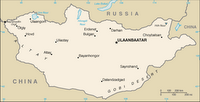
At 604,209 mi² (1,565,000 km²[1]), Mongolia is the world's nineteenth-largest country (after Iran). It is significantly larger than the next-largest country, Peru, and is nearly as large as the US state of Alaska.
The Mongolian heartland consists of relatively flat steppes. The southern portion of the country is taken up by the Gobi Desert, while the northern and western portions are mountainous. The highest point in Mongolia is Nayramadlin Orgil (Huyten Orgil) at 4,374 m (14,350 feet). Uvs Nuur Lake, shared with Tuva Republic in Russia, is a natural World Heritage Site.
Most of the country is hot in the summer and extremely cold in the winter, with January averages dropping as low as -30ºC (-22ºF). The country is also subject to occasional harsh climatic conditions known as zud or dzud. Ulaanbaatar has the coldest average temperature of any national capital in the world.
Mongolia is high, cold, and windy. It has an extreme continental climate with long, cold winters and short summers, during which most of its annual precipitation falls. The country averages 257 cloudless days a year, and it is usually at the center of a region of high atmospheric pressure. Precipitation is highest in the north (average of 20 to 35 centimeters per year) and lowest in the south, which receives 10 to 20 centimeters annually.
 The extreme south is the Gobi, some regions of which receive no precipitation at all in most years. The name "Gobi" is a Mongol term for a desert, depression, salt marsh, or steppe, but which usually refers to a category of arid rangeland with insufficient vegetation to support marmots but with enough to support camels.
The extreme south is the Gobi, some regions of which receive no precipitation at all in most years. The name "Gobi" is a Mongol term for a desert, depression, salt marsh, or steppe, but which usually refers to a category of arid rangeland with insufficient vegetation to support marmots but with enough to support camels.
Mongols distinguish Gobi from desert proper, although the distinction is not always apparent to outsiders unfamiliar with the Mongolian landscape. Gobi rangelands are fragile and are easily destroyed by overgrazing, which results in expansion of the true desert, a stony waste where not even Bactrian camels can survive.
The Mongolian heartland consists of relatively flat steppes. The southern portion of the country is taken up by the Gobi Desert, while the northern and western portions are mountainous. The highest point in Mongolia is Nayramadlin Orgil (Huyten Orgil) at 4,374 m (14,350 feet). Uvs Nuur Lake, shared with Tuva Republic in Russia, is a natural World Heritage Site.
Most of the country is hot in the summer and extremely cold in the winter, with January averages dropping as low as -30ºC (-22ºF). The country is also subject to occasional harsh climatic conditions known as zud or dzud. Ulaanbaatar has the coldest average temperature of any national capital in the world.
Mongolia is high, cold, and windy. It has an extreme continental climate with long, cold winters and short summers, during which most of its annual precipitation falls. The country averages 257 cloudless days a year, and it is usually at the center of a region of high atmospheric pressure. Precipitation is highest in the north (average of 20 to 35 centimeters per year) and lowest in the south, which receives 10 to 20 centimeters annually.
 The extreme south is the Gobi, some regions of which receive no precipitation at all in most years. The name "Gobi" is a Mongol term for a desert, depression, salt marsh, or steppe, but which usually refers to a category of arid rangeland with insufficient vegetation to support marmots but with enough to support camels.
The extreme south is the Gobi, some regions of which receive no precipitation at all in most years. The name "Gobi" is a Mongol term for a desert, depression, salt marsh, or steppe, but which usually refers to a category of arid rangeland with insufficient vegetation to support marmots but with enough to support camels.Mongols distinguish Gobi from desert proper, although the distinction is not always apparent to outsiders unfamiliar with the Mongolian landscape. Gobi rangelands are fragile and are easily destroyed by overgrazing, which results in expansion of the true desert, a stony waste where not even Bactrian camels can survive.


3 comments:
What city will you be living in?
Wow all I can say is that you are a great writer! Where can I contact you if I want to hire you?
top [url=http://www.001casino.com/]001casino.com[/url] check the latest [url=http://www.casinolasvegass.com/]online casino[/url] manumitted no consign perk at the chief [url=http://www.baywatchcasino.com/]baywatch casino
[/url].
Post a Comment